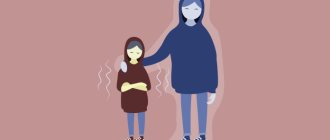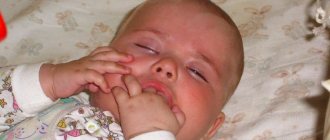Features of adolescence
This age is associated with the transition from the type of relationship characteristic of childhood to a new type of interaction between a teenager and parents.
Getting rid of parental care is a universal psychological goal of adolescence. The period of transition is associated with the fact that parental care is gradually replaced by the adolescent’s dependence on other institutions of socialization (while maintaining emotional ties with parents and his family). This transition creates difficulties for both adults and the teenager himself. We can name features of this age that influence the formation of antisocial behavior in adolescents. These are increased emotionality, the desire for self-affirmation among peers, conformist behavior, the so-called “brawl games”.
The following external factors can influence adolescents in a positive way: the positive influence of peers, the presence of volitional regulation, the emergence of more stable self-esteem, the development of the ability to reflect, the ability to empathize and sympathize with others.
Are you an expert in this subject area? We invite you to become the author of the Directory Working Conditions
Note 1
Thus, adolescence is characterized as a turning point, transitional, critical, difficult, age of puberty.
Precautionary measures
Prevention of the development of asociality in children and adolescents includes the following tips:
- take care of the baby’s emotional state;
- become a positive example for your child, promote a healthy lifestyle and correct values;
- create intra-family trusting relationships;
- If necessary, attend psychological consultations in a timely manner.
Now you know what people with antisocial behavior are like. This does not mean that it is necessary to isolate yourself from communication with such individuals. It would be much more correct to put an antisocial person on the right path, to help him socialize, if this is in your power.
Concept of antisocial behavior
Definition 1
If normal behavior is behavior that presupposes adequate, socially approved behavior with society, then antisocial behavior (or deviant) is behavior that deviates from the norm and is associated with a violation of age-related rules accepted in society at a particular time. time in a specific sociocultural environment.
This behavior can manifest itself in different ways, but, as a rule, it is associated with an increased level of aggression, excessive demonstrativeness, deviation from activities, suicidal behavior, vagrancy, as well as various preventive measures - alcoholism, drug addiction, smoking, unnatural sexual activities.
Finished works on a similar topic
Course work Antisocial behavior of adolescents 400 ₽ Essay Antisocial behavior of adolescents 280 ₽ Test work Antisocial behavior of adolescents 240 ₽
Receive completed work or specialist advice on your educational project Find out the cost
Note 2
It is worth highlighting delinquent behavior separately, because it represents repeated antisocial acts that are already formed into a certain stereotype of behavior and pose a much greater threat to the person himself and society.
The role of the family in the process of formation of antisocial forms of child behavior
The family plays a huge role in the development of the child’s personality, the formation of his behavioral patterns, the system of axiological modes, etc. In families with an unfavorable emotional climate, an unfavorable asocial atmosphere, the risk of developing asocial forms of behavior increases significantly. As a result of the lack of interest in the needs of the child on the part of the parents, he strives to find an emotional response in relationships with others, in other types of activities, as a result of which he may develop unwanted needs and interests.
Finished works on a similar topic
Course work Antisocial behavior of children 460 ₽ Abstract Antisocial behavior of children 220 ₽ Test work Antisocial behavior of children 240 ₽
Receive completed work or specialist advice on your educational project Find out the cost
Authoritarianism and excessive dominance of parents are also one of the factors in the formation of antisocial forms of behavior. In addition, a pronounced dictate from the mother can cause neuropsychic diseases in a child with a weak nervous system, lead to irreparable defects in the development of the emotional sphere, lack of empathy towards others, manifestations of aggression, etc.
A factor that increases the risk of developing forms of antisocial behavior may also be the system of rewards and punishments practiced within the family.
Note 1
It should be noted that in some cases, even apparently prosperous families in a situation of violation of interpersonal intra-family relationships quickly turn into dysfunctional ones, as a result of which not only the child being raised suffers, but also society as a whole. In other words, a transition from a personal intrafamily problem to a social one is taking place.
Causes of antisocial behavior in adolescents
Among the factors that influence the emergence and development of antisocial behavior are:
- biological (for example, temperament),
- social (environment - family, school, friends, etc.),
- self-doubt, low self-esteem,
- social difficulties associated with communication problems,
- lack of interest in life, and therefore the desire to gain new experiences,
- weak willpower and excessive dependence on the environment,
- various experiences of violence or post-traumatic syndromes,
- deviations from norms of behavior that are associated with injuries or any diseases,
- dysfunction in the family or obvious heredity.
Correction of antisocial behavior in preschool children
Alexey Alekseevich Tokarev
Correction of antisocial behavior in preschool children
The issue of antisocial behavior in children is one of the pressing issues in the work of every teacher. What is antisocial behavior ? Antisocial behavior is behavior and actions that do not comply with the norms and rules of behavior of people in society and public morality. From this definition it follows that antisocial behavior is not just behavior , but also actions that are not only committed by children, but in turn do not have the best effect on the psyche of a preschool .
Preschool children are like “sponges”
absorb everything into themselves.
and many other reasons can provoke inappropriate behavior in a child . According to parents, children become “unlike themselves”
and ask teachers to help both the children and the parents themselves.
Some people advise not to pay attention, others say that everything will work itself out, however, practice shows that in reality nothing goes away by itself. A child’s antisocial behavior is , one might say, a cry for help “pay attention!”
An adult does not have the right to ignore the problems of a child, especially
a preschool child .
The question is asked why? But because it affects the emotional state of the child, in other words, if a child has disturbances in the emotional sphere, then there will be disturbances in cognitive activity, because they are interconnected. Let me start with the fact that it is important for parents to convey objective information about their child. Do it in a way that allows them to hear and accept what is being said to them. Under no circumstances should a psychologist tell parents that their child is bad, that who knows what will grow out of him, etc. The psychologist should try to find out, with the help of the parents, what may be causing the inappropriate behavior (action)
child.
Having received the necessary information from the parents, you can begin corrective work with the child . Practice shows that an educational psychologist cannot miss an important point in the process of work: correction will be effective only with an integrated pedagogical approach, when the teacher, psychologist and parents are included in the work.
Only with well-established joint work between teachers and parents will it be possible to see results over time. Today there are many ways to correct children's behavior , one of them is drawing. The teacher asks the child to draw an interesting story about his behavior . By talking with the child about what is good and what is bad during the drawing process, the psychologist can try to lead the child out of bad situations into good ones. You can also play out various situations using plasticine. D. B. Elkonin wrote that everything should be done with a child through play. In this statement, it seems to me, the famous psychologist argued that through play we can see the inner world of a child and help him in his behavior . Another practical way to correct behavior is to ask the child to color a geometric figure (square, triangle, circle, etc.)
or anything else with the following instructions: you don’t need to go beyond the boundaries of the picture.
This technique also affects the child’s behavior , since in it the child shows the boundaries of his limits of permissibility in behavior . The results of such a test can help determine the boundaries of a child's behavior in society .
School objectives for the prevention of antisocial behavior in adolescents
- Monitoring and identification of families at risk.
- Formation of skills for teachers to interact with such families.
- Optimization of psychological assistance to children with school maladjustment.
- Help and support, activation of adolescents’ internal resources, directing them to a positive vision of the world.
- Creation of a humanistic education system.
- Organization of various kinds of additional sections, sports events, leisure activities for teenagers, and recreational activities.
- Career guidance and assistance in employment.
- Promotion of healthy lifestyles.
- Direct work with families at risk.
Get paid for your student work
Coursework, abstracts or other works
general characteristics
Human behavior is formed as a reaction to a combination of several factors: the social environment, a specific situation and one’s own personality. The easiest way to describe the conformity of human behavior to generally accepted norms is to use concepts such as “normal” and “abnormal” behavior. “Normal” can be called behavior that fully meets the expectations of others. It also illustrates a person's mental health. Therefore, “abnormal” behavior deviates from generally accepted norms and may be an illustration of mental illness.
Abnormal behavioral responses come in many forms. Thus, behavior can be: pathological, delinquent, retreatant, non-standard, creative, deviant, deviant and marginal. The norm is determined on the basis of criteria that can be negative and positive. In the first case, the norm is considered as the absence of signs of pathology, and in the second – as the presence of “healthy” symptoms.
From the point of view of social psychology, antisocial behavior is a way of behaving in a certain way without taking into account social norms. This formulation connects deviation with the process of adaptation to society
Thus, deviation among adolescents usually comes down to forms of unsuccessful or incomplete adaptation.
Sociologists use a slightly different definition. They consider a symptom normal if it is more than 50 percent prevalent in the community. Thus, normal behavioral reactions are those that are characteristic of most people. Consequently, deviant behavior manifests itself in a limited circle of people.
From a medical point of view, deviant behavior does not refer to either medical terms or forms of pathology. Its structure includes mental disorders, reactions to situations, developmental disorders and character accentuations. However, not every mental disorder is accompanied by abnormal symptoms.
Psychology and pedagogy define deviant behavior as a method of action that causes harm to an individual and complicates its development and self-realization. In children, this method of response has age restrictions, and the concept itself applies to children over 7 years old. The fact is that a young child cannot fully understand and control his actions and reactions.
Based on various approaches, a general definition of deviance can be formulated. So, deviance is a confident way of acting that deviates from social standards, causes harm to the individual and is marked by social maladjustment.
What does an antisocial person mean?
In order to understand who an antisocial person is and not to confuse this concept with antisocial, misanthropic and others, it is necessary to analyze the psychological root causes of the characteristics of this type of character, which does not belong to pathological disorders, but to the sociopathic spectrum. Initially, this is associated with disorders of the emotional spectrum; for such people it is not only difficult to actively and violently demonstrate their emotions, but even to express them verbally; some states remain closed to description, and only psychotechnicians help to understand what is happening inside. Since others demonstrate their feelings more clearly and talk about them more often, the antisocial type becomes uncomfortable and incomprehensible in their company.
Values and importance are dominated by one's own views and priorities, so social rules and norms will be ignored. For example, if an antisocial person becomes bored, then he will not withstand a cultural pause, wait for goodbye, but will simply leave (performance, guests - it doesn’t matter)
He will also not smile at someone in order to make a pleasant impression; a smile will appear only in a good mood, and polite communication only if there is respect for the interlocutor.
Due to reduced sensitivity in the emotional area, a common reaction to any intrusion or attempt to impose social norms is aggression. It is the only way to respond to any irritants, while in order to achieve what he wants from other people, an antisocial personality easily uses manipulation, lies, and puts on any role. It turns out that asocial human behavior does not exclude adaptation, but uses it only in those situations when it is necessary for him, otherwise a cruel confrontation simply turns on.
A high level of impulsiveness does not allow an antisocial person to find adequate ways to satisfy his desires, but the need to realize them becomes extremely acute and requires fulfillment the second they arise. This leads to the fact that people carry out not very good actions just to get what they want faster, and it is difficult to explain to them the unworthiness of such a choice, since they are not able to understand the feelings of others and their suffering or pain, there is no shame and guilt, as the main regulators of social behavior.
Asocial people are also in no hurry to correct unworthy actions, because even when they see the tears, pain and grief of others, they are completely confident that they are right, and the undesirable behavior of others is considered as manipulation and attempts to exert pressure. They do not analyze their negative actions and do not use them as experience, i.e. once they apologize to someone, they can continue to do the same things.
Many patterns of behavior can emerge from such personality traits, so it is impossible to describe sociopathicity or asociality as a manifestation of one thing in a limited set. There will be no instructions with quotes, but only an understanding of a person’s internal motivation and his social isolation. Even towards their partners, who may be the center of the universe and truly loved, an antisocial person will not show feelings, especially sensitivity. This is difficult to believe for those who are not in close contact with them, because in superficial relationships, antisocial individuals are very charismatic and attract the interest of almost everyone.










